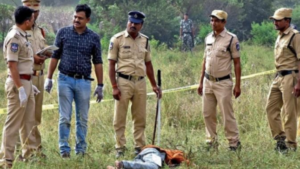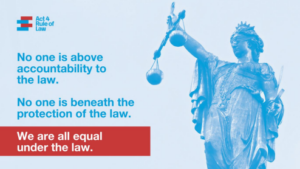
Encounter: can encounter justice be justified in democracy country?

“No person shall be deprived of his life or personal liberty except according to procedure established by law.”. – Article 21 of the Indian constitution
INTRODUCTION
The police are one of the most important institutions in our society, it’s main duty is to maintain rules & orders, laws and a peace in our society. Police officers must arrest the accused and put them up for a trial, it is not a duty to kill. It is very horrifying that extrajudicial executions are occurring more frequently in India.
The encounter was mainly performed by police, military and other security forces and it challenges the Rule of law in a civilised society. In Uttar Pradesh alone, after BJP came into power there are 183 alleged criminals were killed and 23,300 were arrested.
Between January 1, 2017, and January 31, 2022, 655 deaths in police encounters were reported nationwide. Chhattisgarh has the most of these cases—191—followed by UP with 117. Nowadays, Encounter justice got very popular in our country.
It is heavily criticised by the human rights group. In recent and popular extrajudicial killings taken place of Atiq Ahmad, his brother, his son Asad, gangster Vikash Dubey, 4 rape accused in Hyderabad and lots of other cases that are not possible to count on fingertips. But, the main question still arises, can encountering justice be a form of justice that can be justified or does it violates the basic human rights of a person?
LAW RELATED TO ENCOUNTER KILLING

Injustice anywhere is a threat to justice everywhere
There is no separate legislation that gives protection against extrajudicial killing. Section 96 to Section 106 of the IPC, talks about certain circumstances when extrajudicial killing is not counted as an offence but this defence is available to all persons for the protection of their bodies and protection of their properties.
It also talks about certain restrictions like always using proportional force, the aggressor doesn’t have the right to private defence and there shall be instant fear of death and grievous hurt a concern, only available for performing lawful acts. The Supreme Court and Human rights commission several times criticised the police encounter & military encounter.
Section 46 of CrPc which talks about the ‘arrest how made’ clause (3) mentioned that Nothing in this clause grants a licence to murder someone who has not been charged with a crime carrying a death penalty or a life sentence.
In State Of Andhra Pradesh vs N. Venugopal And Others 1964 AIR 33, 1964 SCR (3) 742 The honourable Apex court held that Surrender is the best form of arrest and the police officer didn’t have the power to take the life of any person hence, all accused were held liable for custodial death.
Section 300 of The IPC- Murder
Exception 3. Culpable homicide is not murder, if the offender, who is a public servant or who is assisting a public servant who is acting to further public justice, goes beyond the legal boundaries of his authority and causes death by engaging in conduct that he,
in good faith, believes to be legal, necessary for the proper discharge of his duty as such a public servant, and free from animosity towards the person who is killed.
FAKE ENCOUNTERS

Fake encounters can be defined as an extrajudicial killing of a person by police or military officers or security forces during arrest or in custody by the police officer or military officers or security forces without following the ‘Rule of law’.
The NHRC registered 1,782 fake encounter cases between 2000 and 2017. Similarly to this, at least 2,560 incidents of encounters were reported to the NHRC between 1993 and 2009. 1,224 of them were fake. People who have lost faith in the criminal justice system not only support the officers’ frequent phoney “encounter” killings around the nation, but they
also celebrate them passionately. In the Sadiqi Jamal encounter case (2003), Sadiq Jamal was fatally shot by Gujrat Police, who claimed to have learned of his assassination plans for Narendra Modi from reliable sources.
His only prior offences were an altercation and gambling. Following a CBI investigation, it was discovered that both police and Intelligence Bureau employees had contributed to the phoney encounter.
In the Hyderabad encounter case, Justice V S Sirpurkar Commission recommend that murder charges should be filed against those 10 police officers who were involved in the encounter of 4 rape allegation accused, in his report they submitted that it is cold-blooded murder and CJI Sharad Arvind Bobde also criticised the police action.
RULE OF LAW MUST PREVAIL

People who have lost faith in the criminal justice system not only support the officers’ and celebrate and praise the “encounter” killings around the nation. Recent examples are Atiq Ahmad’s son’s encounter cases where people celebrate and the media also praise the police encounter.
Another example is the Hyderabad encounter case where people not only celebrate but also do warm welcomes with flowers and the media make encounter accused them of being a national heroes.
We need to understand that Article 21 is guaranteed to all people beside of their race, caste, religion, gender, sex, place of birth or previous criminal history. Our Supreme Court several times mentioned that ‘Justice delay is Justice denied’.
It is very important to ensure the Rule of Law in a civilised society and guarantee the rights of the people. In Hyderabad, encounter case investment Justice VS Sirpurkar Commission mentioned that Both mob lynching and extrajudicial killing for quick justice are unacceptable. Rule of Law must be in effect at all times and prevails at any cost. Crimes can only be punished according to procedure established by the law








